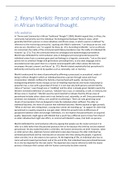2. Ifeanyi Menkiti: Person and community
in African traditional thought.
Info websites
In "Person and Community in African Traditional Thought" (1984), Menkiti argued that, in Africa, the
community had priority over the individual. He distinguished between Western views, which
generally hold that a person is a lone individual, and African views, in which a person is defined "by
reference to the environing community," quoting John Mbiti's statement, "I am because we are, and
since we are, therefore I am," to support his thesis (p. 171). According to Menkiti, "as far as Africans
are concerned, the reality of the communal world takes precedence over the reality of individual life
histories" (p. 171). Thus the communal ethos has ontological and epistemological precedence.
Menkiti also defended the communitarian view on biological and social grounds because the
individual comes from a common gene pool and belongs to a linguistic community: "Just as the navel
points men to umbilical linkage with generations preceding them, so also does language and its
associated social rules point them to a mental commonwealth with others whose life histories
encompass the past, present, and future" (p. 172). Menkiti stated emphatically that personhood is
defined by community and not by qualities such as rationality, will, or memory.
Menkiti underscored his views of personhood by affirming a processual, or procedural, mode of
being in African thought in which an individual becomes a person through social and ritual
incorporation. Menkiti conflates the facticity of personhood with quality. He does this by
distinguishing between muntu mutupu (a man of middling importance) and muntu mukulumpe (a
powerful man, a man with a great deal of force). It is not clear why both persons cannot hold the
status of "person," even though one is "middling" and the other is already great. Menkiti rejects the
Western minimalist definition of a person, "whoever has a soul, or rationality, or will, or memory; the
African view is 'maximal'." Menkiti uses the word maximal to indicate that the African view of
personhood includes other criteria and is not limited to soul, rationality, or will. Since personhood is
achieved, not endowed, in Africa, one could fail at achieving it. There are rules governing social
rituals of incorporation that are designed to help the individual attain selfhood. The older an
individual becomes, the more of a person that individual becomes. Menkiti quoted an Igbo proverb,
"What an old man sees sitting down, a young man cannot see standing up," to support his claim that
personhood is a quality acquired as one gets older. While this proverb hints at differences of
perspective between older and younger individuals, it is not implicit that personhood is an acquired
quality. Opponents might agree with Menkiti that a youth has a different point of view from that of
an older individual but might also affirm, in contrast with Menkiti's views, that both are persons.
Menkiti defended the communitarian ethos by arguing that people use the neuter pronoun it to
refer to a child rather than the personal pronouns him or her because the child has not yet attained
personhood. He also stated that when a child dies, the funeral ceremonies are brief. However, when
an older person dies, elaborate funeral celebrations take place because the older individual has
achieved personhood and has now become an ancestor who lives among the people. In general,
when one dies, he or she ceases to be a person. At the beginning of life, an individual who has no
name will work toward personhood, and at the end of life, that individual loses personhood because
he or she has departed for the next world. The departed ones may be referred to with the neuter
pronoun it because their contact with the human community has been severed.




